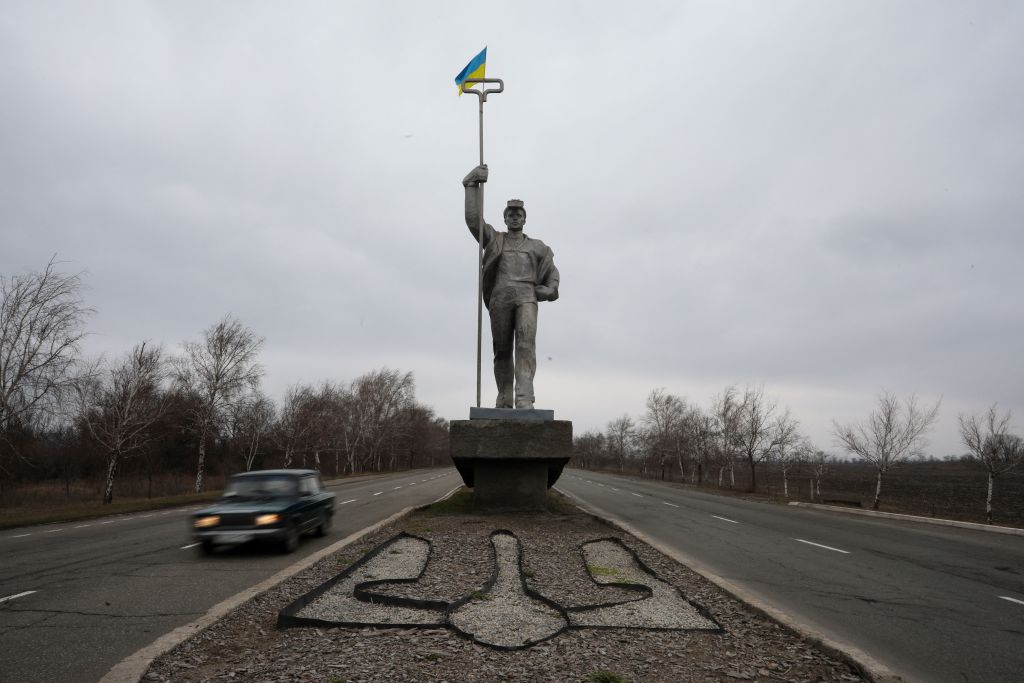Mariupol evacuation fails as 2nd ceasefire agreement collapses


A free daily email with the biggest news stories of the day – and the best features from TheWeek.com
You are now subscribed
Your newsletter sign-up was successful
A second attempt to establish a temporary ceasefire to give civilians in the embattled Ukrainian city of Mariupol a chance to evacuate failed on Sunday as Ukrainian government sources accused Russian troops of continuing to shell the city, CNBC reports.
The Mariupol City Council said earlier that day that Russian forces encircling the city had agreed to stop firing at 10 a.m. local time.
The two sides agreed to a similar ceasefire for Saturday after initially agreeing to the idea on Thursday, but the proposed "humanitarian corridors" in Mariupol and nearby Volnovakha never materialized.
The Week
Escape your echo chamber. Get the facts behind the news, plus analysis from multiple perspectives.

Sign up for The Week's Free Newsletters
From our morning news briefing to a weekly Good News Newsletter, get the best of The Week delivered directly to your inbox.
From our morning news briefing to a weekly Good News Newsletter, get the best of The Week delivered directly to your inbox.
The Moscow Times reported Sunday that, during a call with French President Emmanuel Macron, Russian President Vladimir Putin said the Mariupol ceasefires collapsed because "Ukrainian nationalists" would not allow civilians to leave the city and that Ukrainian troops defending the city requested the ceasefire "only to build up forces and means in their positions."
Foreign policy analyst Clint Ehrlich shared video on Twitter that he said corroborated Russian claims that soldiers from Ukraine's far-right Azov Battalion were forcing civilians to remain in Mariupol to be used as human shields, though Ehrlich also admitted he had trouble making out what the soldier in the video was saying. Several Twitter users replied, saying the soldier told the crying woman in the video that it was not safe to leave the city because Russian forces were still firing.
One Mariupol resident told the BBC on Saturday that there "are many dead bodies lying in the streets and no one can carry them." He also said the city's residents are running low on food and clean water.
A free daily email with the biggest news stories of the day – and the best features from TheWeek.com
Grayson Quay was the weekend editor at TheWeek.com. His writing has also been published in National Review, the Pittsburgh Post-Gazette, Modern Age, The American Conservative, The Spectator World, and other outlets. Grayson earned his M.A. from Georgetown University in 2019.
-
 Crisis in Cuba: a ‘golden opportunity’ for Washington?
Crisis in Cuba: a ‘golden opportunity’ for Washington?Talking Point The Trump administration is applying the pressure, and with Latin America swinging to the right, Havana is becoming more ‘politically isolated’
-
 5 thoroughly redacted cartoons about Pam Bondi protecting predators
5 thoroughly redacted cartoons about Pam Bondi protecting predatorsCartoons Artists take on the real victim, types of protection, and more
-
 Palestine Action and the trouble with defining terrorism
Palestine Action and the trouble with defining terrorismIn the Spotlight The issues with proscribing the group ‘became apparent as soon as the police began putting it into practice’
-
 What is ‘Arctic Sentry’ and will it deter Russia and China?
What is ‘Arctic Sentry’ and will it deter Russia and China?Today’s Big Question Nato considers joint operation and intelligence sharing in Arctic region, in face of Trump’s threats to seize Greenland for ‘protection’
-
 What would a UK deployment to Ukraine look like?
What would a UK deployment to Ukraine look like?Today's Big Question Security agreement commits British and French forces in event of ceasefire
-
 Would Europe defend Greenland from US aggression?
Would Europe defend Greenland from US aggression?Today’s Big Question ‘Mildness’ of EU pushback against Trump provocation ‘illustrates the bind Europe finds itself in’
-
 Did Trump just end the US-Europe alliance?
Did Trump just end the US-Europe alliance?Today's Big Question New US national security policy drops ‘grenade’ on Europe and should serve as ‘the mother of all wake-up calls’
-
 Is conscription the answer to Europe’s security woes?
Is conscription the answer to Europe’s security woes?Today's Big Question How best to boost troop numbers to deal with Russian threat is ‘prompting fierce and soul-searching debates’
-
 Trump peace deal: an offer Zelenskyy can’t refuse?
Trump peace deal: an offer Zelenskyy can’t refuse?Today’s Big Question ‘Unpalatable’ US plan may strengthen embattled Ukrainian president at home
-
 Vladimir Putin’s ‘nuclear tsunami’ missile
Vladimir Putin’s ‘nuclear tsunami’ missileThe Explainer Russian president has boasted that there is no way to intercept the new weapon
-
 The Baltic ‘bog belt’ plan to protect Europe from Russia
The Baltic ‘bog belt’ plan to protect Europe from RussiaUnder the Radar Reviving lost wetland on Nato’s eastern flank would fuse ‘two European priorities that increasingly compete for attention and funding: defence and climate’
